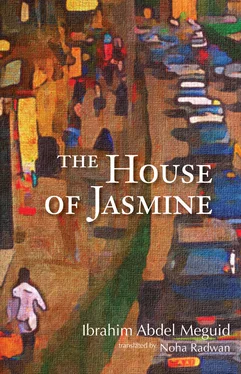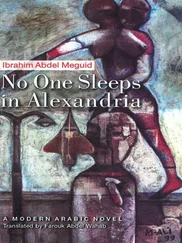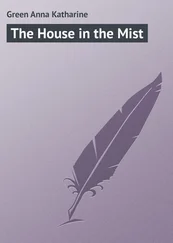It is as though I have found the answer. We are a huge number, and the policemen have no choice but to flee. Every dozen or so of us are carrying one of them and throwing him into the stinking water, causing the rest to run and hide in the streets of Basal Port. Our flood advances to Saba’ Banat Street, moving away from the old bridge — God only knows how it withstood all this.
I’m now at quite a distance from Sayyid Birsho, trying to push through the crowds with my shoulder and arms in order to get closer to him. What kind of jinni is he who has not fallen or stopped chanting? My height allows me to see that the stores on both sides of the street are closed. There is a single deserted tram on the street, the windows of which were smashed by the demonstrators as they passed. I hear Sayyid Birsho forbidding such acts of destruction. His voice is now clear to me because I’m close enough to him. The demonstrators burned down Labban police station after passing it and finding it surrounded by the Central Police. Once again, I catch myself looking at the high windows where there are still more pretty women and girls.
Then Manshiyya Square opens before us, and there’s a chilly draft, and large mobs coming from the direction of ‘Urabi Square. They are students from the school of engineering, the school of arts and letters, commerce, law, the whole university, as I learn from bits and pieces of conversation flying around me. “We, the students and the workers, against the capitalist coalition. . ” I chant more slogans after Sayyid Birsho, and see the happiness on the faces around me as we read the approaching signs: “Long Live the Struggle of the Students and the Workers.” The phrase is on signs everywhere and it sounds like all hell has broken loose and everything is going to burn to the ground. It’s a mad uproar, as though we’re in the middle of thunder and earthquakes. Even the buildings seem as if shocked into complete stillness. We’re not scared by the Central Police trucks coming toward us from Tawfik Street, against traffic, or from Salah Salim, Nasr, or the Corniche. Nor are we scared by the ones blocking the side streets and alleys or the huge number of policemen jumping out of the trucks to surround us. This is an empty gesture, for we own the ground and space of both Manshiyya and ‘Urabi Squares. We fill the parks and the roads and our roaring fills the air like a tempest. The spontaneous order imposed by Saba’ Banat Street, and then by Maks Street, is disrupted, and it becomes impossible to tell the workers from the students or separate the men from the women. I find myself next to two girls, and think that I should move away, but one of them looks at me and says:
“God! Why are you so tall?” Then she smiles at me and at her colleague. I don’t know how to answer. I’m truly flustered.
“The bastards have started to attack!” she cries, and her eyes gleam with ferocity for a minute, after which I can’t see her anymore. Feet trample bodies, and there are lions’ roars and pigeons’ squeaks as stones fly. Blue smoke covers everything, and buckshots tear into clothes and flesh. But in the end the square clears to reveal us, just as we have been before, angry in joy, ecstatic with the cold and the adventure. I feel fresh blood pouring into my veins. The wind is whistling above my head and banners are fluttering. I see policemen running away down the alleys, chased by small groups of demonstrators. They look pathetic. I remember the girl who spoke to me earlier, and smile.
I’m not sure how the old building, which had served as the Socialist Union for a while before it returned to its original function as the Stock Market, burned down, how the demonstration divided into two, one going down Chamber of Commerce Street and the other going along the coast, or why I joined the one on the coast. It must have been because Sayyid Birsho was at its front. We meet with more large groups of students, who join us. I don’t know where we were heading. The sea breeze is strong and loaded with water, which sprays in our faces and sets us running and laughing, making our army stretch forward. Nassar’s Restaurant, and others like Mustafa Darwish, Atheneus, the Louvre Café, and Mon Signor, are all burned down. Where did all the stones we tossed at the poor policemen come from? How did the tiles of the sidewalks come loose so easily, as if they had been placed there only to wait for us? How did it get to be four o’clock? How did I escape from the fire and smoke at Raml Station, in front of the Sidi Ibrahim Mosque, at Silsila and Shatbi? I approach Sidi Gabir Station alone. Did I lose them, or did they lose me? Was I with them, or did I walk alone half the way? How did Sayyid Birsho disappear and get away from me? I remember hearing someone giving an order to return to Manshiyya, and another ordering us to take shelter at the university. I do not remember paying any attention to either one. By then my feet were taking me away. The streets around me are empty of both vehicles and pedestrians. There’s a burned bus on Gamal ‘Abd al-Nassir Street and a burned tram at the station. Now I’m considering going home. I remember that a train leaves Misr Station in the evening going to ‘Amriyya. It passes Sidi Gabir Station, then goes around Alexandria to Muharram Bey Station, Qabbari, Maks, and then into the desert. I have known that since I came to live in Dikhayla. That would be my only commute, and from Maks, I would walk to Dikhayla.
#
I was exhausted when I arrived at the station. The large parking lot in front of it was empty. The station itself was empty, no passengers, workers, or guards. Only iron windows, iron doors, and the cold grim English decor of the walls. I sat alone on a cold wooden bench whose smoothness made it even colder. I was surprised to feel a strange sexual excitement. If I were the one leading these thousands in an official rally, how much money would I have made? I looked around the station. The cold felt different from the cold of the morning. It was piercing, and I could almost see the icy air blowing madly, causing paper scraps to fly over the tracks. The cold empty tracks seemed to extend infinitely, and the few trees around me were bare. I could see only the back of a man far away, dressed in black and urinating against a wall. The place was quickly getting dark. This is really winter, and this is what traveling is like. I put my tired head between my hands and stretched my legs, surrendering to terrible exhaustion and fierce hunger, waiting for a train that might never come. Then I broke into tears, weeping with a sound that resembled a roar.
A teacher who had been sent to work in Sharjah returned home. His telegram to his family had not yet arrived. He opened the door of his apartment at night, and stepped in quietly to surprise his wife and two children. He opened his bedroom door to find his wife under a man. She looked at him, and he looked at her. He quietly retreated. His feet found the door to the apartment as he walked backward. He went out and down the stairs backward as well. He went backward into the street, and walked backward down the road. Everyone who saw him confusedly made room for him to pass. His children, who had appeared out of one of the alleys, followed him. They looked at him, and he looked at them. He stretched his hands out to them. They stretched their hands out to him. He could neither stop nor walk in their direction, and every time they caught his hands, they slipped away again, the children crying incessantly. All of Alexandria came to know him. People stepped out of his way, traffic lights and vehicles yielded to him. The man and his children disappeared and people almost forgot about them, but I had a dream about him: he was in space, orbiting around the earth, his children orbiting around the moon.
Читать дальше












